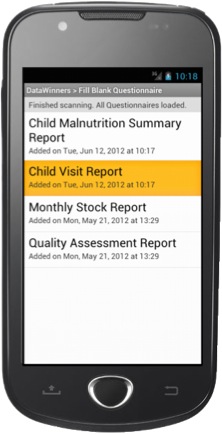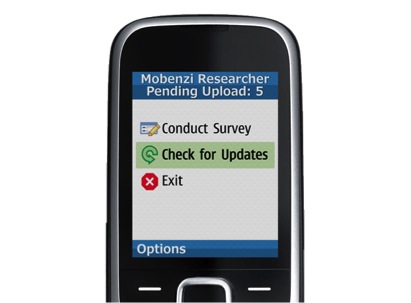Hi, I am Kerry Bruce, Director of Results and Measurement at Pact. I am part of Pact’s central technical team that provides monitoring and evaluation support to more than 20 country offices and more than 70 projects around the world. In 2012 we started to roll out the use of mobile technology in our programs. We have begun integrating mobile technology into our programs by using mobile phones for baseline and endline data collection.
Hot tips:
 Mobile technology has advanced significantly since the last time you likely considered using it and now is the time to invest in learning about this technology. Many of the early bugs have been worked out and the commercially available platforms make collection of data via mobile phone or tablet quite easy.
Mobile technology has advanced significantly since the last time you likely considered using it and now is the time to invest in learning about this technology. Many of the early bugs have been worked out and the commercially available platforms make collection of data via mobile phone or tablet quite easy.- New platforms are easy to use, there are many to choose from and most include built in dashboards that help you to review and visualize your data.
- A careful assessment of network coverage, power and power back-up should be done before you decide on a type of phone and platform. While you don’t necessarily need a signal to use mobile phones to collect data (you can collect data offline) you will need a phone with long battery life! Many phones are now GPS enabled—and you should consider these if you would like to collect GPS waypoints and conduct geospatial analyses.
- Understand the skills and competencies of your data collectors. Will they be people who are familiar with mobile phones or will they need significant training and mentoring? What type of phone will be easiest for them to use?
- If you are using mobile phones for data collection of a baselines survey, for example, will you have a follow on use for the phones? You’ll want to consider what type of phone will be most useful for future activities so that you can yield a higher return on investment of your initial purchase.
- A careful assessment of your data collection needs, logistical issues, and possible future projects is necessary before you start utilizing mobile technology.
- Because not everyone sees the benefits of mobile technology, a basic overview of the advantages of this innovation is helpful to get your co-workers on board.
Rad Resources:
- Online mobile technology training for a variety of uses is available for a fee from TechChange.
- There is a free online mobile data collection selection assistant at NOMAD.
*Thank you to Mobenzi Researcher and DataWinners (DataWinners free data collection App for Android devices built using Open Data Kit tools) for the use of their images in this post.
Do you have questions, concerns, kudos, or content to extend this aea365 contribution? Please add them in the comments section for this post on the aea365 webpage so that we may enrich our community of practice. Would you like to submit an aea365 Tip? Please send a note of interest to aea365@eval.org . aea365 is sponsored by the American Evaluation Association and provides a Tip-a-Day by and for evaluators.


Excellent post!! Thanks for sharing your valuable tips.
Great to see this. I predict that this will be the big hot topic at #aea2013 this year.
I love this post! I work for public health and we have been discussing how to systematize obtaining client feedback across our performance management system. I think mobile technology is an important solution. I have a copy of QuickTapSurvey on my iPad, although I haven’t had the opportunity to use it as yet I’m hoping to in the near future. Thanks for the reminder!
Kerry,
Thanks for the article but please note that there are SERIOUS inaccuracies in the NOMAD website. I wrote to them 6 months ago pointing out that their system:
– eliminated EpiSurveyor (now Magpi) if the user said they needed a Symbian-compatible product — although Magpi is the most widely-used Symbian-based data collection system in international development
– eliminated EpiSurveyor/Magpi if the user said they needed an iOS app — though Magpi has an iOS app
– eliminated EpiSurveyor/Magpi if the user said they needed an SMS solution — though Magpi indeed allows for both app-based AND SMS-based data collection.
Basically, NOMAD eliminates the possibility of having EpiSurveyor/Magpi in the recommended results — something that would be surprising to our 17,000 users worldwide who love our product on iOS, Android, Symbian, and SMS.
I’ve written to them again today asking — again — that they correct these grave inaccuracies, which do a disservice to their users.
Sorry, meant to include the address to our Magpi mobile data collection system: http://www.magpi.com
With Magpi, you can quite literally register in 60 seconds and be creating forms and collecting data in less than an hour.